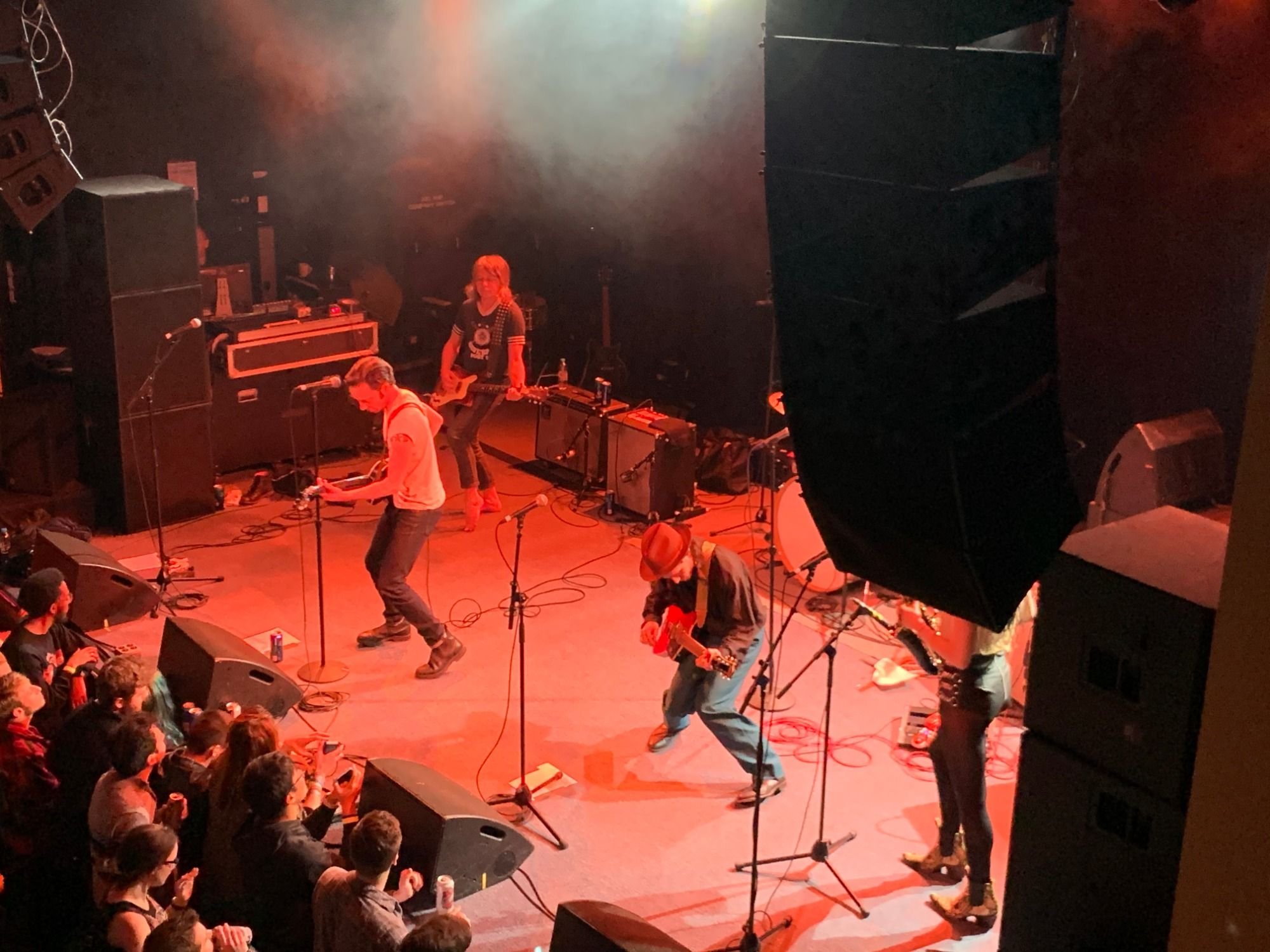Black Lips: Harmony Through Chaotic Individuality

Listen
On Wednesday February 26, The Sinclair hosted Georgia-based southern punk band Black Lips as they toured their new album Sing in a World That's Falling Apart. As the band emerged onto the stage, my first thought was, this is an eclectic bunch. On the far left of the stage stood guitarist Jeff Clarke completely barefoot and wearing your standard t-shirt and jeans. Next to him stood guitarist Jared Swilley channeling his inner greaser with a slick haircut, plain white t-shirt with rolled up sleeves, cuffed jeans, and fine black leather shoes. At the middle-right was guitarist Cole Alexander donning a dark brown country-style pork pie hat, a loose black shirt, green dress pants, and formal brown leather boots. On the far right was saxophonist Zumi Rosow wearing a black leather skirt accented with chains, snakeskin boots, a loose band t-shirt, and lanyards around her neck. At the back of the stage was drummer and harmonica player Oakley Munson wearing the band’s Johnny Cash inspired t-shirt under his leather vest. Each band member, except Munson, is a vocalist. Clarke’s singing is reminiscent of Johnny Cash and Willy Nelson’s speak-singing: maybe not as melodious as some other vocal styles but perfect for storytelling. Swilley has a high, strong voice perfectly suited for singing classic rock. Alexander has a deeper voice with a heavy southern accent, and his vocal style is arguably the "most punk." Rosow has a higher raspy voice, one that paired wonderfully with Clarke’s when the pair sang “Chainsaw” together in an acoustic encore.
This seemingly incongruous blend of fashion and vocal styles makes more sense when one considers the band’s wide variety of musical influences. First and foremost, Black Lips is a punk band. Their lyrics and singing style are generally violent and transgressive discussing things like drugs, sex, and general outlaw-ish behavior. As a mild example, their song “Gentleman” begins with the lyrics, “This ol’ middle finger has grown fat and tired from flicking the bird.” It doesn’t take an overly attentive ear however to pick out a wide mix of musical influences beyond punk. Their song “Georgia” begins with a gallavanting guitar riff found all over classic country (for an example, see Johnny Cash’s “I Walk the Line”). “Holding Me Holding You” is reminiscent of outlaw country speak-song ballads. “Odelia” is clearly heavily influenced by rockabilly era vocal harmonies. Finally, the influence of early blues music can be heard in the moany saxophone riffs of songs like “Cadillac Jack” and “Crystal Night” as well as the harmonica accompaniment in the song “Rumbler.” The Black Lips's combination of musical influences results in a distinctive sound that could have only developed in the Deep South. The brand of transgressive behavior they sing about is decidedly rural as well, conjuring up images of the wide-open road, highway truckstops, rodeos, and back country landscapes. Just a little time with their new album will convince you that punk is not synonymous with urban.
Black Lips concluded their show with a cover of The Almighty Defenders’ song “Hippie, Hippie, Hoorah.” As the rhythmic bursts of guitar chords shook the building, the members of the crowd violently bobbed their heads to the beat, and I pondered what it was that made Black Lips’s music so special. I was impressed by how well they wove so many disparate genres and styles together. I was impressed by their vocal and instrumental talents. But what made them different from your run-of-the-mill psychobilly band? I thought back to the beginning of the performance. I scrutinized each member of the band: Clarke barefoot and on his tippy toes, Swilley with slicked back hair and squatted stance, Alexander strumming jerkily and chaotically, and Rosow bowed to the floor tambourine in hand. This group of individuals had turned all of The Sinclair into a single, pulsating organism through what could have easily become a nonsensical combination of genres. The chaotic individuality of their music had produced a sense of harmonious unity that pervaded the atmosphere of the venue. Maybe for Black Lips, the key to cooperation lies in embracing and validating the disparate influences that make us who we are. Or maybe, they just love to play good music. Either way, if they keep it up, they just might save this world that's falling apart.
// Cade Williams '23 is a DJ for The Blues Hangover, on air 5 a.m. - 9 a.m. on Saturdays and 7 a.m. - 11 a.m. on Sundays EST